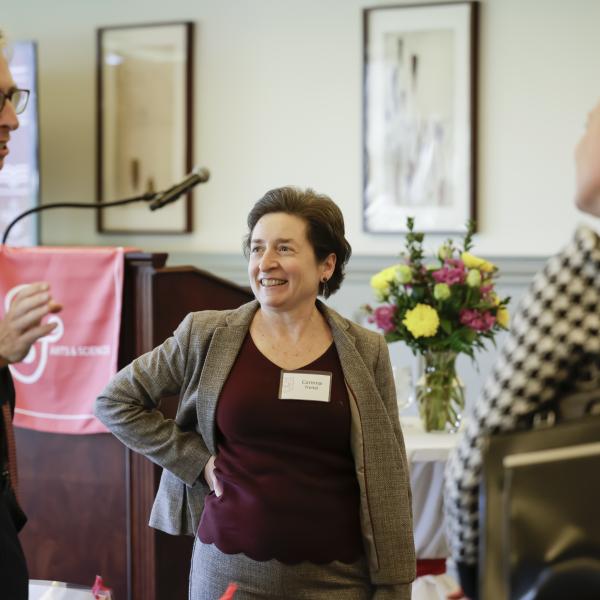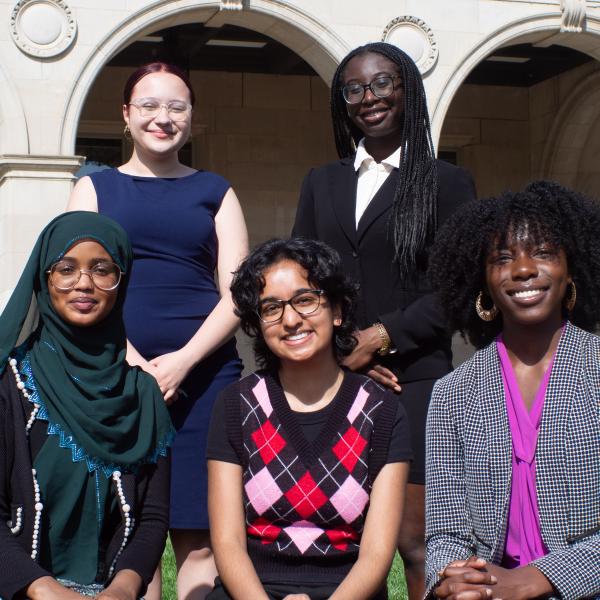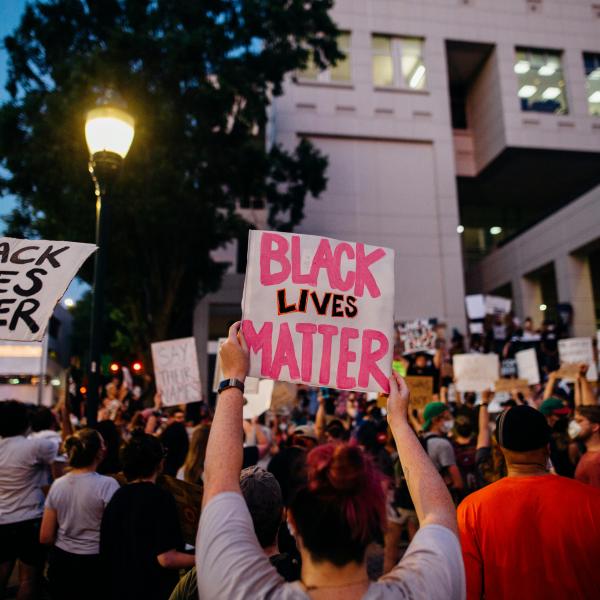Almost 500 years after William Shakespeare lived and wrote, students are still studying his work, and actors are performing his plays to packed theaters around the world. What keeps us coming back to his texts? Why has Shakespeare's work lived on when so many other great writers have been abandoned? As a sneak peak of the series to come, all of the participants of "Summer with the Bard" share their answers and perspectives on this tricky question.
Transcript:
Rebecca King: Hi there, listeners. I’m Rebecca King, and you’ve just tuned in to Hold That Thought. Now, before we get too far into our Shakespeare series, I wanted to stop and ask a question that some of you are already thinking: Why Shakespeare? It’s almost 500 years later, and we’re still talking about his work, still performing his plays, and high school students around the world are studying his texts. Of all the authors out there, why Shakespeare? Well, I posed this very question to all of the participants of the series, so as a kind of preview of what’s to come, I’ve compiled all of their answers, and the opinions here vary. You wont hear the same answer over and over again. In fact, at least one of our participants is vehemently opposed to limiting our view to only Shakespeare, but we’ll get to her response in a bit. First up, we return to Bruce Longworth, the associate artistic director of Shakespeare Festival St. Louis, and Mike Donahue, the director of their Shakespeare in the Park production of Antony and Cleopatra, which is in the middle of its run. Performances continue till June 14th.
Bruce Longworth: You want me to go first on that one, or do you want me to take that? You know, part of the answer to the question is the question. It is 500 years later, and we are still talking about it. There is something going on in the material that is timeless and that appeals to a variety of cultures all over the world. I mean, Shakespeare is done not just in this country but all over the world in a lot of different languages, and they all seem to find relevance in it. I think it has to do with large themes. It has to do with the remarkable humanness in the material that speaks over time. And I also think there is an openness about the way in which it can be done that allows for people to do it in new ways—in new ways that still respect the original material but can open up avenues of discussion and appreciation that change over time in response to what has happened in history.
Mike Donahue: That was great!
BL: Thank you!
MD: My answer will be so less articulate than that. I mean, I think these plays are written to be done with nothing more than some good actors and the text and an audience, and that is all you need to do this plays and that is still all you need. The language in these plays, when you have good actors, is so alive. They are like pyrotechnics, and they are so unbelievably human, and I think the plays, all of them, are actually quite imperfect and messy and ways that feel wholly human and idiosyncratic, and I think they also support so many different interpretations. It’s like, no matter how much you keep digging, there are always new ways of reading these plays and finding yourself in them.
BL: And I like to think if Shakespeare were alive today, he would be sitting in the hall going, “Yeah, do it! That’s a good idea. Do it that way. I didn’t think about it like that.” Don’t you think?
MD: Yeah.
RK: Assistant Dean and Lecturer in Women, Gender, and Sexuality Studies Jami Ake will be talking about the women of Shakespeare and the battle between the sexes later in the series. She also regularly teaches one of the Shakespeare survey courses at Washington University in St. Louis. For her, some of Shakespeare’s staying power can be attributed to the fact that we are still in conversation with many of the issues Shakespeare was grappling with in his day.
Jami Ake: I mean, it sounds a little cliché, but I think there’s so much of the same stuff that we’re struggling with that’s so much a part of those plays. You know, the early modern period was one of tremendous upheaval. There were a lot of anxieties about capitalism, about gender, about rulership, about the future of a country and wars and colonialism, and this is all the stuff that we’re dealing with; this is all we can talk about. When you read something like Othello, and you start to see really how much Shakespeare seems to be foregrounding the dynamics of racism, how racism works, how internalized racism might work, how stereotypes of gender and race kind of collude to create these tragic event and then we turn around and we see every other news story now is very much about what we don’t understand about the effects of structural violence and oppression. It’s been there the whole time, this sort of exposé on the consequence of all of these things crunched together and put together in a very short time, and it’s right there, which is why I think it’s so resonant.
RK: For Professor Robert Henke, who teaches drama and comparative literature at Washington University in St. Louis, the pleasure of Shakespeare’s work isn’t just that we can recognize and continue to struggle with some of the same issues today but that as a modern audience, we have to find these familiar themes in the unfamiliar.
Robert Henke: I think that part of the power of Shakespeare is its historical difference. I think it’s this thrill of finding something familiar in the unfamiliar. I don’t think it’s just that Shakespeare perfectly translates the world through 2015. There are strange and foreign and repellent things. He seems to sort of use the anti-Semitism in Merchant of Venice—I mean, there’s a lot of debate about this, but it sort of plays well at certain points. I mean, Shakespeare was an opportunist, above and all he wanted to make money and great theatre, so there are some time-bound and historical conditions. But I think it’s obviously, tremendously translatable. I don’t know if universal is the word, but it can just be translated and readapted into so many contours. I think it’s this play of sameness and difference. It’s the thrill and the humanity of finding something common that is also strange. It’s like traveling. You don’t go to Italy just to meet other Americans; you go because it’s different.
RK: For Robert Wiltonburg, the Dean of University College and a professor of English, who will be talking about the theme of mercy in Shakespeare’s plays later in the series, one of the biggest draws of the Bard’s work is the reoccurring idea that the choices we make, not the circumstances we were born into, make us who we are.
Robert Wiltonburg: Many answers, of course, have been proposed to that. Probably the most frequent one is his skill in characterization. He creates characters of many different kinds: old men, young women, people of high estate, low estate. He somehow gets inside all of their heads and finds the right words for every one of them in every situation. And I guess that’s sort of the literary genius. The thing I’d also say that keeps him particularly fresh is that he is the first one to imagine the moral world in which we all live or want to live or are trying to live. In Shakespeare, everyone wants to be a king, thinks of being a king, and they find themselves in circumstances, whether they’re comic or tragic, in which the choices they make are more important than the circumstances they begin from. That’s much the way we are and find our lives to be, at least in privileged, modern America. There are parts of the world and even parts of our own country in which that is still not true, in which people are in the grip of circumstances that prevent them from flowering their personality into aspirations, but Shakespeare imagined a world in which the choices you make are the things that determine how things work out. That’s not to say they determine everything, because you are born to a certain position, a certain gender, a certain mentality, you face a set of circumstances. Hamlet says, “Oh cursed spite, that ever I was born to set it right.” But what you do in those circumstances defines you, and I think that is the thing that keeps it always fresh. Because we are always thinking of ourselves as people who create ourselves through our choices. Shakespeare is the one who shows you what can happen, what can go right, what can go wrong, what’ll make that turn comic or turn tragic or turn mixed. He’s not the only one to have done that, but he did it in a way that is just so memorable that we keep coming back to it.
RK: However, Musa Gurnis, an assistant professor of English who specializes in Early Modern Theatre, is actually very against reducing this time in theatre history down to a single playwright. And this makes a lot of sense given the scope of her work. Instead, she’s interested in what the many writers, actors, and the fledging theatre business of London reflect back about this society at that time.
Musa Gurnis: For me, it’s not Shakespeare. Actually, I am emphatically not Shakespeare focused. To me, what’s much more interesting and what I think is a much fuller way to think about the cultural impact of the theatre of that period is not through the artificially narrow lens of one author, but more broadly in terms of how people experience the invention of the commercial theatres in the late 16th century I think was a watershed moment in the history of theatrical representation and the history of sociality. I mean, this is the most mixed class theatre there has ever been at any time in English. All of the sudden, there is just this incredible explosion in terms of the range of subjects represented. I think that what the theatre meant socially for Londoners undergoing the massive transformations of that period—early urban capitalism, the political and religious shifts, and so on—the theatre as an institution was really a place where the culture, as Steven Mulley puts it, “gave early modern London a place to think about itself.” I don’t think we can limit our thinking about that to just what Shakespeare’s doing.
RK: Finally, Joe Loewenstein, a professor of English and the director of the Humanities Digital Workshop and the Interdisciplinary Project in the Humanities, flips the original question on its head to understand the ebb and flow of the Bard’s popularity over time. He then looks forward to another 500 years from now to guess whether we’ll still be studying Shakespeare or even recognize the Shakespeare they’ll be discussing.
Joe Loewenstein: Why Shakespeare is hard? Shakespeare’s reputation was pretty much consolidated in the 18th century, the middle of the 18th century. He was celebrated. He was admired by his contemporaries, but no more celebrated than Beaumont and Fletcher. No more celebrated than Ben Johnson. If you ask me whether we’ll be still admiring, still paying close attention to Shakespeare in 500 years, the answer I would give you is “could happen.” There are an awful lot of very famous, very important authors from the past who are no longer in report. Robert Southey was possibly more important in his day than Wordsworth, but not anymore. There’s a famous writer of prose fiction, Amadis of Gaul. Everybody read him. Cervantes made fun of him. Nobody reads him anymore. Most of us have only heard of him because Cervantes has made fun of him. There was a European and American admiration for Goethe that seemed indestructible, but the ways against Germany pulled Goethe out of the curriculum in the English speaking world and we don’t know Goethe much at all. I mentioned Johnson, Beaumont, and Fletcher. In the Restoration, no one thought Shakespeare was as good a comic writer as Johnson was. That opinion’s revered itself. Shakespeare looks like he’ll last because of institutions. It used to be an entering freshman at WashU would probably have read two or three Shakespeare plays before she’ll have started. It’s now not uncommon for them to have read four or five or six. I think it’s because a number of other writers who we used to think needed to be studied in high school have dropped out. So it could be that he’s going to capture more and more market share. The fact that quoting Shakespeare or talking about Shakespeare is itself a kind of guarantor of a person’s sophistication, education, erudition, that’s probably good for Shakespeare’s immense that we keep quoting him to show that we’re smart. I’m pretty sure that if we’re still reading him in 500 years, we won’t be reading the same Shakespeare that I’ll read. My students think of him as an erudite poet, as a brainy poet, as sophisticated. His reputation in the 17th century was as an unsophisticated, natural poet. He was once read as someone whom the theatre kind of held back, who was really a non-dramatic poet at heart. Now we read him as a consummate actor, director, person of the theatre. There were times in our history when Shakespeare was thought of as a great progressive thinker. There were times when he was thought of as a reactionary. I expect him to last a long time, but I don’t expect the Shakespeare that people are reading in 100 years to have the same profile, heft, color, texture as the Shakespeare that my students and I read together.
RK: Professor Loewenstein’s point is well taken. The Shakespeare we know and love may continue to evolve as literature, society, and our world continue to change, because literature and history are dependent on context. But in the light of the present, clearly Shakespeare’s work and plays still resonate with students, academics, and audiences around the world. And so, for the next few weeks at least, we’re spending the summer with the Bard, exploring his life, his legacy, and how we think about him today. Many thanks to all of today's participants, including Bruce Longsworth and Mike Donahue of Shakespeare Festival St. Louis and professors Jamie Ake, Robert Henke, Robert Wiltonburg, Musa Gurnis, and Joe Loewenstein of Washington University in St. Louis. Check back as many of the scholars you heard today will share their thoughts and research on William Shakespeare. As always, you can find Hold That Thought and all of our archived episodes at holdthatthought.wustl.edu. That’s holdthatthought.wustl.edu.
Credits:
Audio Free Music Archive: Kevin Macleod, Podington Bear, Krackatoa, Chris Zabriskie




